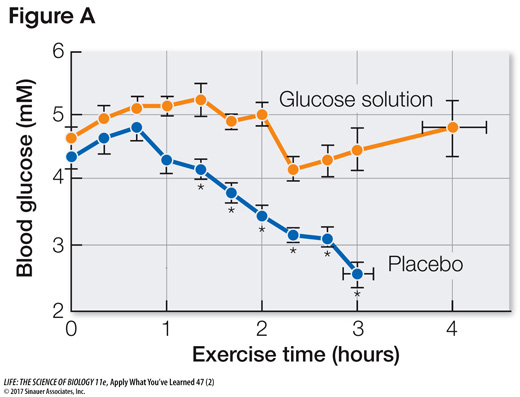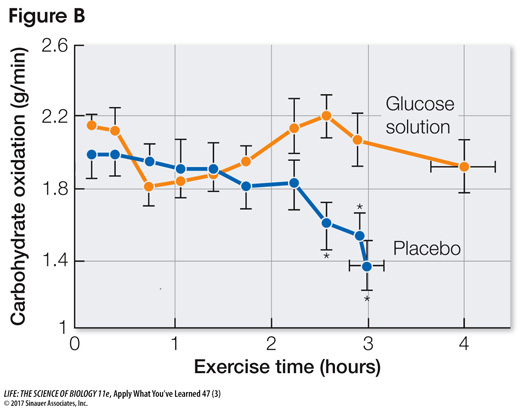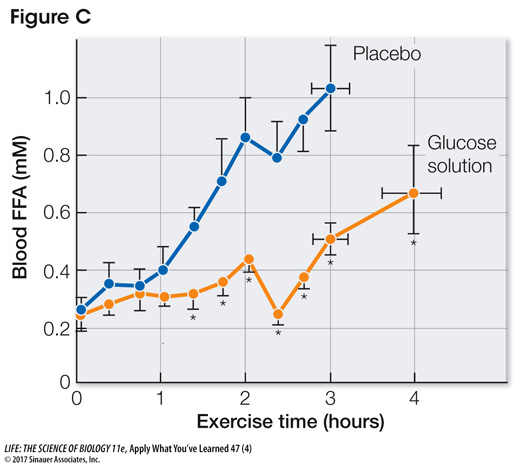Apply What You’ve Learned
1021
Review
47.2 Three systems supply ATP to muscles for contraction, and together they determine the work capacity and endurance of a muscle.
Original Paper: Coyle, E. F., A. R. Coggan, M. K. Hemmert and J. L. Ivy. 1986. Muscle glycogen utilization during prolonged strenuous exercise when fed carbohydrates. Journal of Applied Physiology 61: 165–
An athlete trained for endurance can sustain repeated muscle contractions far longer than someone without such training. But even trained athletes have a limit on how long they can exercise before their muscles become fatigued. One factor necessary to sustain muscle activity is the type and amount of metabolic fuel used. In this study, researchers investigated whether administering carbohydrates to athletes as they exercised would affect their time to fatigue.
Seven male, endurance-



| Treatment | Muscle glycogen at 0 hours | Muscle glycogen at 2 hours | Muscle glycogen at 3 hours | Muscle glycogen at 4 hours | Time to fatigue (hrs) |
|---|---|---|---|---|---|
| Placebo | 163 ± 13 | 60 ± 9 | 37 ± 5 | No data | 3.02 ± 0.19 |
| Glucose solution | 173 ± 11 | 71 ± 11 | 44 ± 12 | 39 ± 8 | 4.02 ± 0.33 |
| P = 0.27 | P = 0.22 | P = 0.30 | P = 0.01 |
Questions
Question 1
In these two trial groups, what were the effects of strenuous aerobic exercise on blood glucose, muscle glycogen, and carbohydrate utilization?
In both groups muscle glycogen fell to about 25 percent of its resting value by the point of fatigue. There were no significant differences (P > 0.05) in muscle glycogen at any time point in the two groups. Thus over 3 hours both groups depleted their muscle glycogen at about the same rate. Blood glucose in the placebo group fell steadily after the first hour, but blood glucose did not fall in the glucose-
Question 2
Did glucose feedings have an effect on time to fatigue? Did this effect involve maintenance of blood glucose and a slowing of muscle glycogen depletion?
The difference between the two groups in time to fatigue was significant, and therefore the data show that carbohydrate feeding delayed muscle fatigue. Carbohydrate feeding also maintained blood glucose levels and the rate of carbohydrate oxidation. In addition, the data show that up until hour 3, this effect does did not involve a slowing of muscle glycogen depletion.
Question 3
Consider one more piece of data: comparing the muscle glycogen levels for the glucose-
For the glucose-
Question 4
Using the data on blood FFA levels in the two groups, develop an explanation for the overall effects of the glucose feeding on the energy metabolism of the subjects.
The body uses a mixture of carbohydrate and fats as fuel for ATP production via oxidative metabolism. Fats are slower to be mobilized than carbohydrates. The blood FFA data indicate that the placebo group began to depend more on FFA metabolism after 1 hour of exercise, but the glucose-
Question 5
Suppose you have a friend training to run a marathon. Based on this study, suggest something your friend might do to improve his or her performance and ability to complete the long-
Suggest eating small snacks composed of simple sugars periodically during runs to prolong the time to fatigue.
Go to LaunchPad for the eBook, LearningCurve, animations, activities, flashcards, and additional resources and assignments.